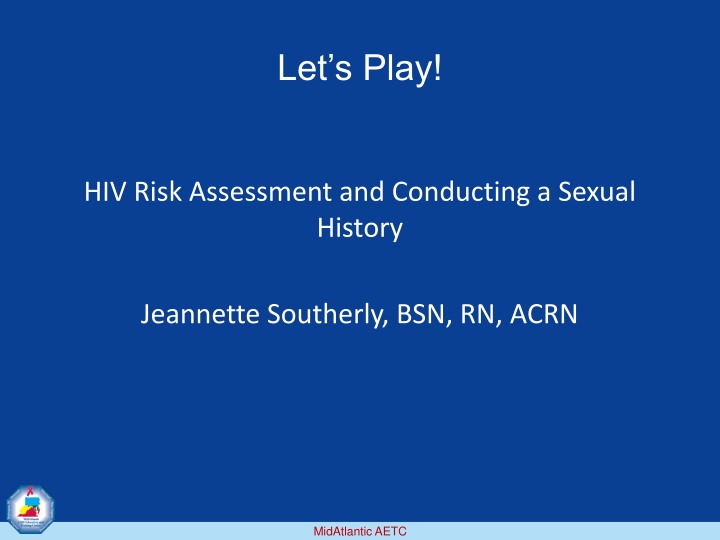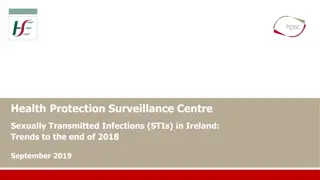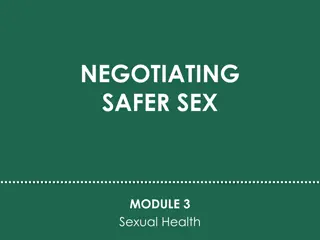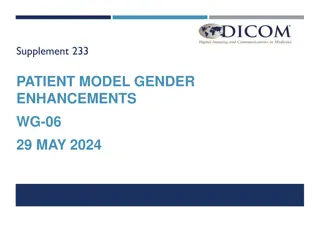
Conducting a Sexual History and HIV Risk Assessment
Explore the importance of asking about sexual history and conducting HIV risk assessments to address the rising rates of STDs in the U.S. Get insights on the lack of adequate sex education in schools and the need for healthcare professionals to initiate conversations about sexual health.
Download Presentation

Please find below an Image/Link to download the presentation.
The content on the website is provided AS IS for your information and personal use only. It may not be sold, licensed, or shared on other websites without obtaining consent from the author. If you encounter any issues during the download, it is possible that the publisher has removed the file from their server.
You are allowed to download the files provided on this website for personal or commercial use, subject to the condition that they are used lawfully. All files are the property of their respective owners.
The content on the website is provided AS IS for your information and personal use only. It may not be sold, licensed, or shared on other websites without obtaining consent from the author.
E N D
Presentation Transcript
Lets Play! HIV Risk Assessment and Conducting a Sexual History Jeannette Southerly, BSN, RN, ACRN MidAtlantic AETC
Why Ask about Sex? The U.S. has the highest rate of STDs in the industrialized world (8/2018) CDC estimates nearly 2.3 million new STIs occur every year in the US, half of those young people aged 15 24 Rates: gonorrhea rose by 67% syphilis by 76% chlamydia by 21% According to the CDC, 2017 surpassed 2016 as the year with the most reported STD cases on record and marked the fourth year in a row that STDs increased steeply in the U.S. Because Sex is a Health Matter!!! http://www.ashasexualhealth.org/stdsstis/statistics/ https://www.cdc.gov/std/stats16/default.htm MidAtlantic AETC
Percentage of High School Students Who Were Ever Tested for HIV,* by Sex, Grade, and Race/Ethnicity, 2015 100 80 60 Percent 40 17.9 20 13.4 13.1 12.9 12.5 11.9 11.8 10.8 0 Total Male Female 9th 10th 11th 12th Black Hispanic White *Not including tests done when donating blood 12th > 10th (Based on t-test analysis, p < 0.05.) All Hispanic students are included in the Hispanic category. All other races are non-Hispanic. Missing bar indicates fewer than 100 students in this subgroup. Note: This graph contains weighted results. West Virginia - YRBS, 2015 - QN85
Dont Ask, Dont Know, Dont Tell 64% women 18-44 said it s up to health professional to initiate conversations about STDs YET Only 10% said health professional raised subject of STDs other than HIV/AIDS Only 3% brought up STDs themselves Larkin, JAMA Women's Health Newline, Background Briefing, posted July 13, 1998 MidAtlantic AETC
We Dont Ask Less than 40% of primary care clinicians obtain a sexual history routinely in new adult patients We ask even less often during successive visits Diamant et al. 2000 MidAtlantic AETC
Sex Education Not Adequate in Most US Schools In most U.S. states, fewer than 1/2 of high schools and just 1 in 5 middle schools teach essential sex education topics recommended by the CDC, according to a CDC report. The report shows the percent of schools providing sexual health education that meets CDC's criteria is generally low and varies widely by state. Among the key findings for schools that teach all essential topics were: high schools (grade 9, 10, 11, or 12) ranges from 21% to 90% middle schools (grade 6, 7, or 8) ranges from 4% to 46% With nearly of HIV diagnoses and of all STI in the U.S. occurring among those under 25, sex education in schools represents a missed opportunity for delivering critical HIV & STD prevention knowledge & skills U.S. Centers for Disease Control and Prevention - December 9, 2015 MidAtlantic AETC
Taking a Comprehensive History Discuss sexual identity/orientation: Assess level of self-acceptance Identify risk behaviors for: Unintended pregnancy Sexually transmitted diseases Ask about sexual abuse Ask about sexual satisfaction MidAtlantic AETC
Sexual History Prepare the patient: Now I am going to take a few minutes to ask you some direct questions about your sexual health. These questions are very personal, but it is important for me to know so I can help you be healthy. I ask these questions to all of my patients regardless of age or marital status and they are just as important as other questions about your physical and mental health. Like the rest of this visit, this information is strictly confidential.
Things to Remember Remember the patient may need to express fears or concerns, and to relieve the stress associated with this type of interview. It is important providers display a non-judgmental attitude so patients are comfortable revealing sexual behaviors. Throughout the interview remember to reinforce behaviors that reduce risk, (eg condom use) and reiterate and tailor prevention messages as you get to know your patient s sexual history. Identify and reduce barriers to obtain sexual history. Address issues of confidentiality. Patients may reveal situations that are outside the norm or illegal. Have a plan to deal with a third party. Sexual histories should be between the patient and provider MidAtlantic AETC
The CORES Model Clarify what the patient is saying, especially if they use jargon and generalizations Be objective in how you ask questions and respond to answers Reassure the patient about confidentiality Show empathyfor the patient s condition, lifestyle or situation Summarize what the patient says so you can check for understanding Remember to look for both verbal and non-verbal cues MidAtlantic AETC
Partners Partners in lifetime, 12 months, 2 months Who, what, when, where and how Inquire about the gender of sex partners (ask everyone about gender of sex partners don t single out) Ask about partner s risk factors including current or past sex partners and drug use If more than one partner is noted in last 12 months explore more specific risk factors such as condom use (or non-use) and partner risk-factors Inquire if patient has ever exchanged sex for drugs, gifts or money MidAtlantic AETC
Teens Care needs to be taken when introducing sensitive topics such as sexuality with teenagers. It is important to interview the teen alone and reinforce confidentiality. Start with asking about neutral topics like school, sports, or other activities. Discussions should be appropriate for the teen s developmental level and you should be explicit. MidAtlantic AETC
Practices Prepare patient for explicit dialogue about sexual practices What kind of sexual contact do you have or have you had? Genital - penis in the vagina Anal - penis in the anus Oral - mouth on penis, vagina, or anus Use of sex toys Use of drugs/alcohol, esp. IDU MidAtlantic AETC
Risk of HIV Infection by Sexual act or Activity Exposure Type (sexual act or activity) Average chance of becoming HIV+ per exposure 9 in 10 13.4 per 2000 exposures 10 per 2000 exposures 6 per 2000 exposures 2 per 2000 exposures 1.3 per 2000 exposures 0.2 per 2000 exposures 0.1 per 2000 exposures Blood Transfusion Needle Sharing (for IDU) Receptive (bottom) unprotected anal sex Needle Stick Receptive unprotected vaginal sex Insertive (top) unprotected anal sex A man getting a blow job A man giving a blow job to another man based on: MMWR (January 21, 2005 / 54(RR02);1-20)
STIs Have you, your current or past partners ever been diagnosed with an STI? When, where, what, how Ask patient if they would like to be tested HIV, chlamydia, gonorrhea, syphilis, trichomoniasis Explain procedures for specific testing (i.e. blood-work, genital exam, oral swab) History of HPV or abnormal PAP History of Herpes MidAtlantic AETC
Pregnancy You may determine a patient is at risk for becoming pregnant or fathering a child. Determine if pregnancy is desired. Make questions gender specific. Are you trying to conceive or father a child? Are you using contraception or any form of birth control? Do you need information or a referral for birth control? MidAtlantic AETC
Concluding the Sexual History Thank the patient for being open and honest and praise protective practices Inquire about patient s concerns regarding the interview Ask if patient has other questions about their sexual health or practices Address high-risk practices (talk about prevention) Make referrals or develop plan for testing MidAtlantic AETC
Summary: When Should We Ask? As often as possible: At every routine visit Whenever clinically pertinent: Ask patients with pharyngitis about oral sex Ask patients with suspicious injuries (bruises on breasts, genitals) about a history of abuse MidAtlantic AETC






















